#taiping heavenly kingdom
Text
If you're not big into martial arts, you might not have heard of sanda, originally created as CQC for Chinese soldiers. It's often decried by just about everyone as being, essentially...just MMA rather than having roots in traditional Chinese kung fu.
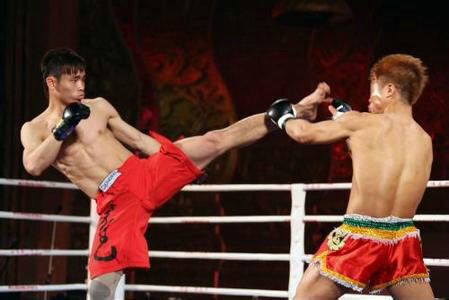
That's only half-accurate. I'll explain why, but I need to catch you up the nearly one hundred years before it's creation for context.
(CW for war crimes, brief mention of sexual assault, mention of Native American oppression, and political cartoons with a racist depictions of Asians - and as always, if someone knows better, please correct me)
The first thing you need to understand is the Century of Humiliation, a concept in Chinese historiography. The premise is that China was regularly fucked over from the 1840s to the 1940s when the communists took full control of the mainland. While this is a narrative heavily pushed by Chinese nationalism, it's not exactly wrong - they had it pretty bad, and thought not exclusively the fault of foreigners, a lot of it was, including the two Opium Wars where England and France wrecked China's shit for the right to keep the drug trade going. The Second Opium War is where the UK first got Kowloon, which would be followed later by the rest of what would become Hong Kong.
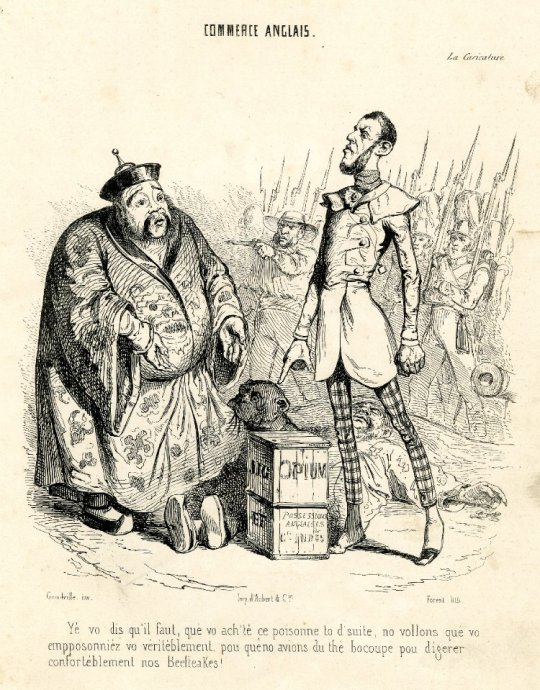
English Commerce
I tell you to immediately buy the gift here. We want you to poison yourself completely, because we need a lot of tea in order to digest our beefsteaks.
The Taiping Rebellion, from 1850 to 1864, is estimated to have cost up to about 30 million lives, compared to the American Civil War's 700 thousand. And let me tell you, it's crazy we don't talk more about the Taiping Rebellion, not only because of the devastation but because the rebels were a very strange branch of Chinese Christian that believed their leader to be the brother of Jesus Christ. Which...well, I guess that's also technically the West's fault, although Western Christians were heavily divided on how they felt about the Taiping Heavenly Kingdom, and ultimately after some indecision and putting feelers out to the rebels, the West chose to back the Qing.
For the people who love the DDR because their enforcement of laws were not always necessarily the worst in the entire world for queer folk: the Taiping Heavenly Kingdom was spectacularly feminist for it's time, way more than East Germany was pro-queer! Maybe consider switching over to Chinese Christofascism?
(I'm sorry, I'm going to be angry about that literally forever)
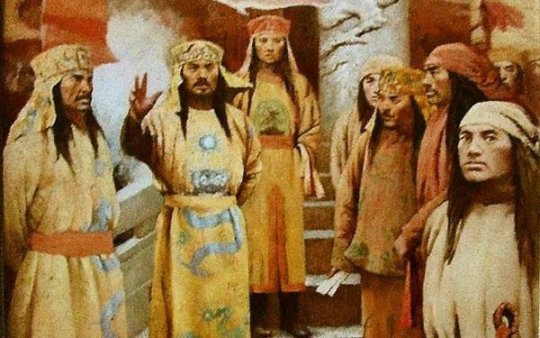
China would go on to badly lose the Sino-French War and Japanese-Sino War, the two together resulting in China losing suzerainty (essentially control of foreign affairs) over Vietnam and Korea, and a lot of their influence outside their own borders.
At this point, you can start to see how China was being treated by the West...and Imperial Japan, who, as we've discussed, were great big westaboos. Everyone wanted a piece, and it was a race to get the biggest. They didn't think in terms of what China wanted, they hardly considered themselves in opposition with China, but rather each other.
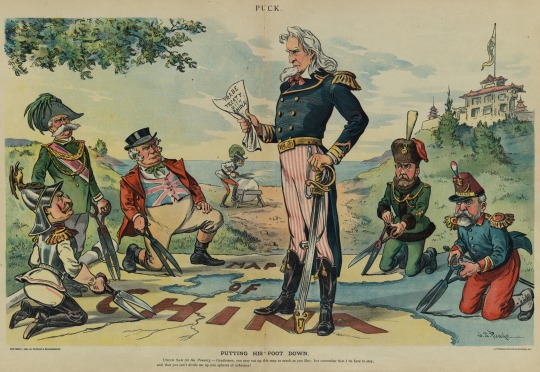
Putting His Foot Down
Uncle Sam: Gentlemen, you may cut up this map as much as you like, but remember that I'm here to stay, and you can't cut me up into spheres of influence!
Needless to say, the Chinese were...not pleased with how things were going.
The traditional narrative is that the Qing's modernization efforts were, at best, a very mixed-success. There's been more questioning of that, though, since "modernization" is inherently kinna a Eurocentric term with arbitrary values. Just before the Japanese-Sino War, everyone was pretty certain "modernization" had gone great and they were going to crush Japan like ants. The Qing did face issues with corruption and firing shells that had their high-explosives siphoned to be sold off, but considering Russia has had to deal with essentially the same problem in Ukraine finding their reserve tanks to be hollow tin cans, I'd say that's fairly modern.
Social instability would continue to rapidly worsen after losing the First Sino-Japanese War, during which Japanese acts of brutality were enough, as I mentioned in my previous historical post, to elicit at least temporary scandal among the Western Powers Imperial Japan hoped so desperately to impress. Tensions were especially high with Christian missions, culminating in an incident in which two German missionaries were killed in an attempt to kill a third accused of rape. That led to Germany invading and taking away yet another piece of China's sovereign territory. Not helping things was that, because of special protections for the practice of Christianity forced on China by treaties from those prior conflicts, many bandits were "converting" or claiming to have done so in order to escape the law. And all of this is in the midst of serious natural disasters ruining lives and leaving people with nothing.
So that brings us to 1899, the main point of this post, and something you may have only heard of before in a throwaway line on Buffy the Vampire Slayer. I'm talking about the Boxer Rebellion.
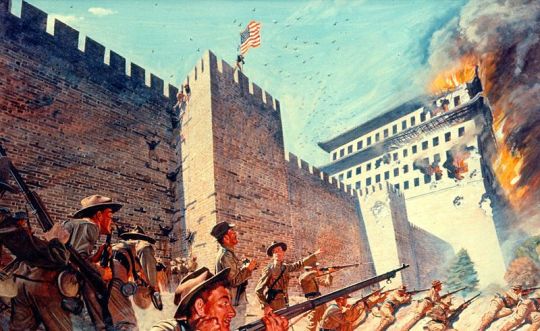
It was then that an escalating series of murders against Christians (missionaries and converts) and attacks on telegraph wires and railroads blossomed into something like but not quite a revolution, the most notable event being the Siege of Peking (Beijing), where over two thousand Christians and foreign civilians took refuge until the formation of the Eight-Nation Army, an alliance of Italy, Russia, the United States, the UK, the Austro-Hungarian Empire, Japan, Germany, and France, invaded to rescue them.
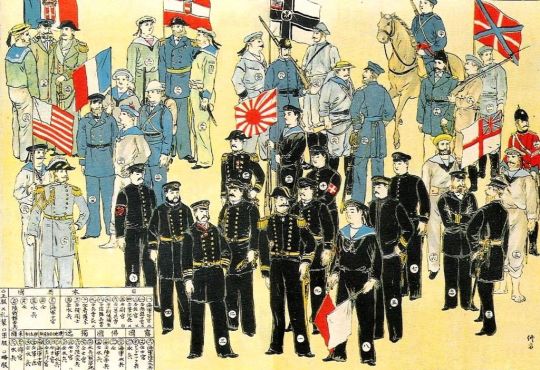
You might assume that "Boxer" came from someone's name, or a major location, or something like that, right? The name actually conceals the reason I find the Boxer Rebellion so interesting, and why we're talking about it today. See, back then, kung fu was referred to as "Chinese boxing" in the West.
The Society of Righteous and Harmonious Fists were just one extralegal organization that flourished in late 1800s thanks to the Qing slowly losing their grip on governing even within some parts of their own territory. They weren't just anti-foreigners, they started out pissed at the Qing for the ongoing troubles, and fighting government control is where they got their start. Yet, they famously used the battle cry "support the Qing, destroy foreigners" - hey, wasn't this supposed to be a rebellion by an extralegal organization?
Ha - well - while she initially condemned them, Empress Dowager Cixi would later throw in with the Fists, at least partly because the prince stanned them so hard he met with her wearing one of their uniforms. This, it seemed, was a legitimate path to expelling all foreigners.
So, right now you're probably thinking back to where this post started. The natural conclusion at this point is that the Fists surely lost, but their martial arts were impressive, right? And then that became sanda?
Well.
No.
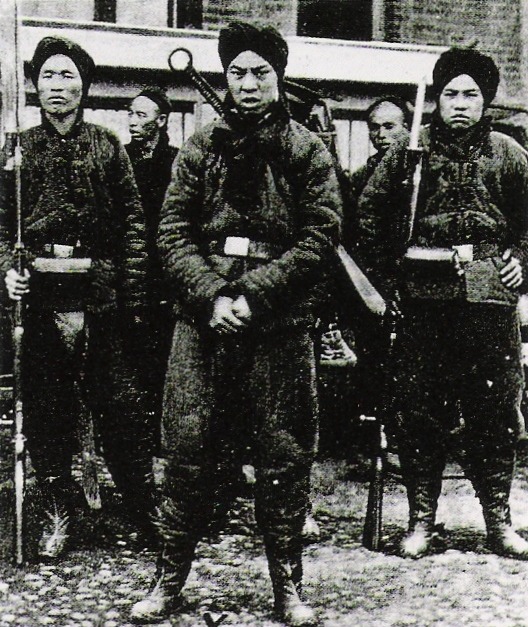
The movie Boxer Rebellion (1975) depicts martial artists jumping into crowds of armed soldiers and devastating them with the awesome power of kung fu. You might expect this to exaggeration typical of action movies, and it is, kinna. It's also only half of what the Society of the Righteous and Harmonious Fists thought they were capable of.
The Fists believed their kung fu made them invulnerable to blades and bullets, including cannonballs. They thought they could fly. They thought ghost warriors would descend from the sky to help drive out foreign armies. Though they had some firearms, they were mostly armed with blades if anything at all. The Empress ordered the Qing military to assist them, but generals wisely chose to do the bare minimum or outright ignore the command entirely.
Even stranger was the legends that grew around the Red Lanterns. You can think of the Lanterns as a kinna women's auxiliary to the Fists, who spurned women lest they "pollute" their masculine magic kung fu and cause it to fail. The Lanterns were divided by age between Black Lanterns (older women), Blue Lanterns (middle-aged women), and most famously, the Red Lanterns, who were eleven to seventeen.
Like the Fists, Red Lanterns possessed magical powers. They could fly, but also, unlike the Fists, walk on water and stop guns, among other things. When Catholic women were accused of making that masculine kung fu magic fail by exposing themselves, the Fists resolved to wait for the Red Lanterns to arrive, since their magic would be immune to corrupting femininity.
I want to take a moment to say I know how all this sounds, and I've tried to keep my language serious at least in this section because I don't mean to paint the Fists as "stupid" for the things they believed. It's important to keep in mind the Fists were largely peasants driven by nationalistic fervor and desperation from how bad things had gotten thanks to foreigners, natural disasters, and the Qing's own corruption and internal failures. It's depressingly reminiscent of ghost shirts, which just ten years prior had failed to stop bullets during Wounded Knee. The population was despondent and angry, with little still left to lose. That led them to kill innocent people prior to dying themselves to an enemy they never had a chance against. People like Mark Twain, Leo Tolstoy, and others outright took the Fists' side at least in terms of "who started it".
More often than not, history is sad.
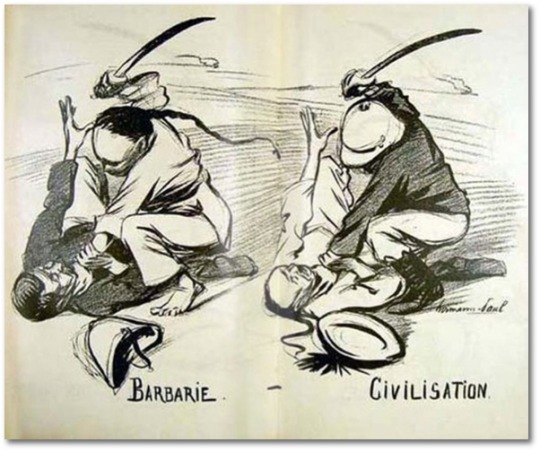
So the Boxers lost, badly. Empress Dowager Cixi was given a pass for siding with them because she was more useful on the throne than off it, but the Qing would fall about a decade later in the middle of trying once again to further "modernize". China fell a free-for-all between warlords, ultimately coming down to the Kuomintang's Republic of China and the Chinese Communist Party. The two would (barely) work together to resist Japan during the Second Sino-Japanese War, which quickly became part of World War II. Soon after they fell back into conflict, with the Kuomintang forced to retreat to Taiwan and still claims independence that the PRC still denies.
In Taiwan is the Republic of China Military Academy, which was known as the Whampoa Military Academy when it developed sanda in the mid-20s. It is, basically, MMA. Traditional martial artists certainly played a part in it's early history, but they were doing what Bruce Lee would fiercely advocate for decades later - "absorb what is useful, discard what is not". Foreign combat sports, like Muay Thai and (actual, Western) boxing were worked in as well. Like in MMA, a background in traditional martial arts can be helpful going in, but you're going to have to learn a lot more and probably unlearn several things as well. The biggest influence was actually the lei tai, raised platforms where Chinese brawlers engaged brutal and often fatal matches, sometimes with weapons even. Like, people had organs come out on the lei tai, it was nuts.
The reason MMA and sanda look so similar is that that's just what comprehensive and effective fighting looks like. It's the same reason England doesn't use gyroget ammo for their guns while Germany equips their soldiers with fully automatic crossbows. In video games, which I love with all my heart, fighting styles as diverse as sumo and capoeira are presented as more or less equally balanced, with different advantages and disadvantages. That's not how it works. We solved the optimal way to hold your arms and it's not like this.
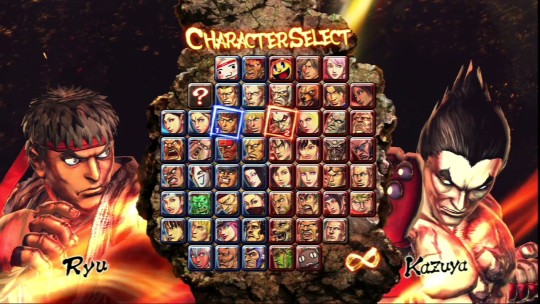
You may have heard of Xu Xiaodong, a Chinese man trained in sanda who has a history of fighting and handedly winning against supposed masters of kung fu. The PRC hates him for that because, like with pseudoscientific traditional Chinese medicine, kung fu is a useful promoter of nationalism, and it's better at that if it keeps it's mystique as impenetrable as possible.
I would probably like a lot of modern Chinese martial arts movies if not knowing that they were bankrolled to be propaganda for the PRC, like the first Ip Man, which exists to further the myth of wing chun and remind everyone that Japan sucks for what happened during WWII. I don't think they're making many movies about the Boxer Rebellion.
11 notes
·
View notes
Text

"Based off that one bootleg Bart Simpson Gulf War T-shirt. I don't know why that thing exists, but I know even less why I decided to make a poorly executed parody."
#taiping heavenly kingdom#hong xiquan#historical art#artists on twitter#memes#gulf war bart simpson#siege of nanjing
100 notes
·
View notes
Text
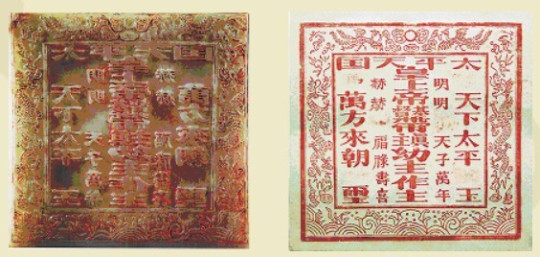
seal of the taiping heavenly kingdom (1851-1864)
7 notes
·
View notes
Text
"why is the younger generation not interested in politics" "why isn't gen z voting like other generations"
probably because you haven't been putting forward candidates like these anymore!! we need candidates we want to vote for!!
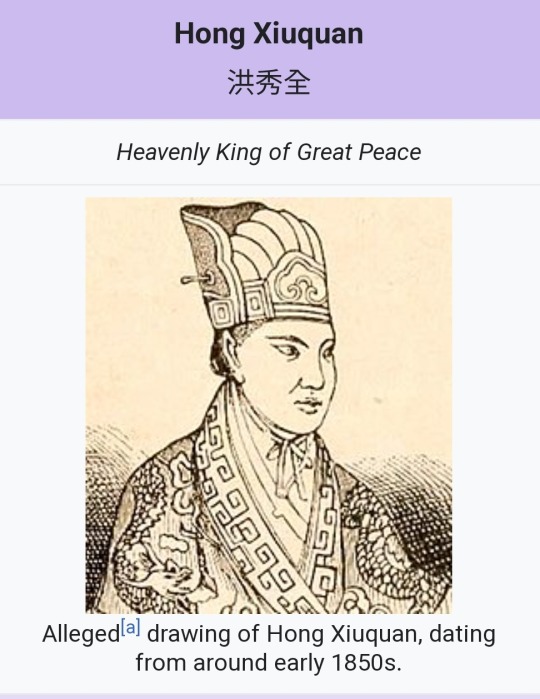
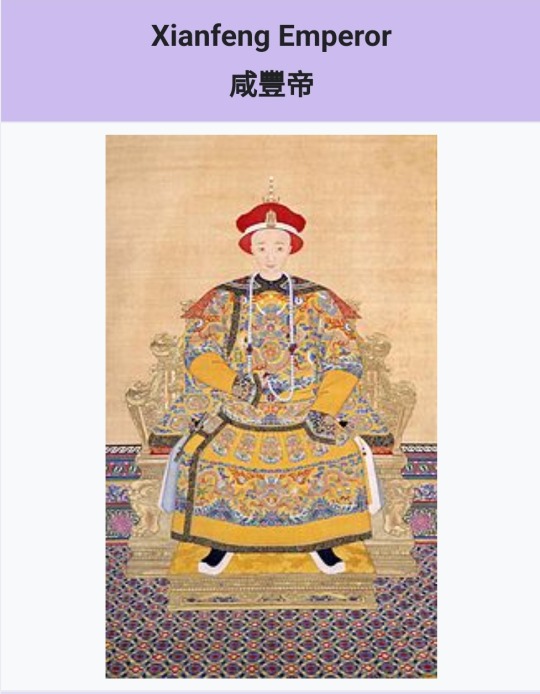
719 notes
·
View notes
Note
Assumption: you're a mormon fundamentalist taliban osama bin laden marxist leninist dengist sinn fein lincolnite gay war criminal chechen separatist montagnard proto-feminist yudkowskyan shining path gay narco peshmerga taiping heavenly kingdom shinto anti-woke anti-cash quaker jesuit nudist jain dharma undecided major FREEMASON thinfluencer lesbo-croatian seinfeld muslim brotherhood narnia hippocratic oath monophysite rhodesian bush war "five points" of calvinism descartes ted kaczynski wagner group neoliberal zanu pf deep ecology champagne socialist
largely correct
121 notes
·
View notes
Text
HONG XUANJIAO // GENERAL
“She was a Chinese female general and rebel leader during the Taiping Rebellion. She was said to be the younger sister of the leader of Taiping Heavenly Kingdom, Hong Xiuquan, and is the wife of Xiao Chaogui, the West King. She led women into the battlefield against the Qing dynasty for the Taiping cause.”

11 notes
·
View notes
Text
On This Day In History
July 19th, 1864: The Qing Dynasty defeats the Taiping Heavenly Kingdom at the Third Battle of Nanking.
42 notes
·
View notes
Note
Humans in almost every Monkie kid fanfic: sure we can have peace demons OWO. It not every single time your the instigator and make your entire village is your subject that had to sacrifice there children to you and sure there’s not a single instance of demons changing for the better by their own will without any outside factors (pls fact Check this) but we can let bygones be bygones OWO
Humans would react in real life even with Sun Wukong truce: https://m.youtube.com/watch?v=BRkhgxVcUXo (this actually fit pretty well you can make it historical by changing the Roman rebels to the Taiping, the Romes to the demons, and the “emperor’s will” to Sun Wukong truce and yes that the Taiping rebels were horrific that’s actually perfect because it could be a plot point in the story).
hey buddy u good?? xvx
like I said, demons are just a type of being, there's good and bad in them just as there is humans. and I can fact check you on that! uwu
we have plenty of notable stories in Chinese mythos that corroborate that demons aren't inherently evil and the sole perpetrators of violence.
for instance, the story of the White Snake is one of them! the snake sisters only fought back due to human's suspicions of their motives. and there's a whole subset of stories from the Qing dynasty that is just about fox demons cultivating their powers peacefully, and even being able to earn appointments in heaven if they do so in a goodly manner. there are of course the huyao who will seek the easy way and just suck human's energies, and end up inviting some sort of heavenly retribution for it.
even in jttw, we have a few demons who are just chilling and not causing trouble!
for example, there's the turtle demon in goldfish demon arc. he was cultivating by himself near the river, and when the pilgrims needed help to cross it, he offered to carry them on his back in exchange for buddhist teachings so he could finally take human form!
and there's the nine headed lion, who was a fairly decent ruler of his kingdom. he never ate people, he just got in trouble cus his subjects stole the pilgrim's weapons.
also i gotta let you know: human sacrifices were, also done by humans against humans, back in the day ahsbsjbdjs
all that said, i dont mean to imply that the truce was an easy thing, far from it! that's why it took a bodhisattva to do it, and a very stubborn and sociable one at that xD Wukong is a politically savy guy, and he knows how to get what he wants. the truce wasn't achieved perfectly peacefully mind you, but it wouldnt have got to a point of having a civil war about it.
20 notes
·
View notes
Note
all these upstarts will never have anything on the taiping heavenly kingdom
how bad could it-
oh

4 notes
·
View notes
Text
I will be adding this to the sotb page eventually when it's ready for proper viewing again (it's kind of in uhhhh construction mode) but here are the books that I've shortlisted in my research for Swallows on the Beam.
THIS IS NOT A COMPLETE LIST. I will continue adding to this list as I find titles I know I've read before. These are just the books that I personally own. And as a side note I am only including George Kerr's Okinawa because it's one of the only histories of Okinawa in English, it's NOT good and the guy wrote it in 1958 so his perspective on Okinawans, Chinese, and Japanese people is EXTREMELY skewed by the Second World War being so recent in his memory.
(ID: Eight photos of books. The first photo is a stack of six books on a table. From bottom to top, the books are The Ryukyu Kingdom: Cornerstone of East Asia by Mamoru Akamine, The Secret History of the Mongol Queens by Jack Weatherford, Cults Inside Out by Rick Alan Ross, Okinawa: The History of an Island People by George Kerr, Our Land Was a Forest by Kayano Shigeru, and The Great Game: The Struggle for Empire in Central Asia by Peter Hopkirk. The other seven photos are photographs of covers of books on a Kindle screen. Those books are in order: Hokkaido: A History of Japan's Northern Isle and Its People by Ibrahim Jalal, China from Empire to Nation-State by Wang Hui, trans. by Michael Gibbs Hill, Cultish: The Language of Fanaticism by Amanda Montell, God's Chinese Son: The Taiping Heavenly Kingdom of Hong Xiuquan by Jonathan D. Spence, Hawaii's Story by Hawaii's Queen by Liliuokalani, Imperial Twilight: The Opium War and the End of China's Last Golden Age by Stephen R. Platt, and The Romance of Three Kingdoms translated by C.H. Brewitt-Taylor.)

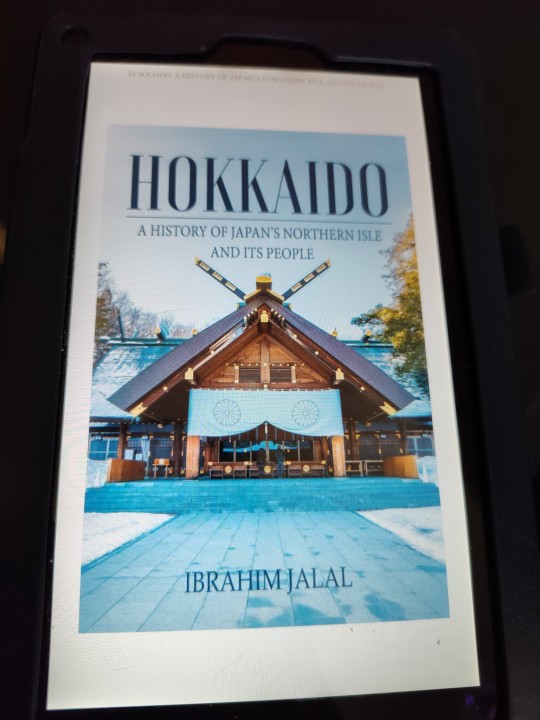



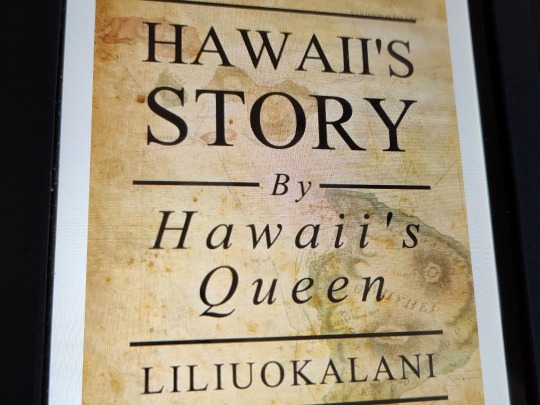

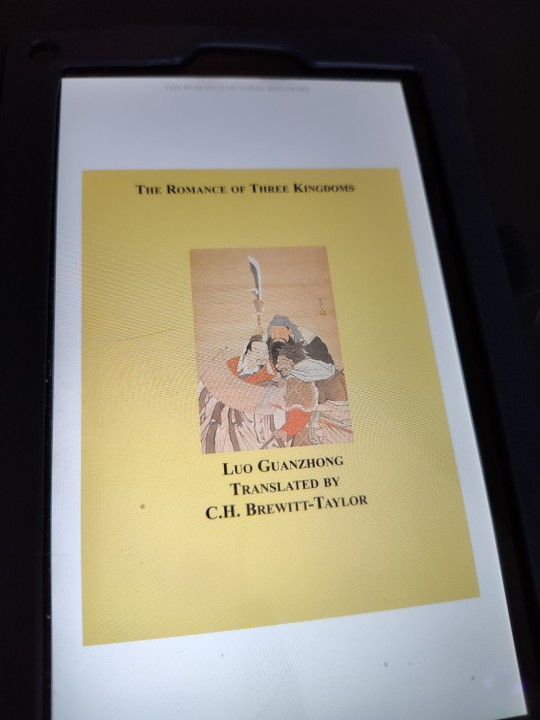
#sotb#swallows on the beam#book recommendations#alix is probably autistic and can't be bothered to get dxed
10 notes
·
View notes
Text
reading up on both the Taiping Rebellion and the Shimabara Rebellion and man
civil unrest in Japan and China seems to have been on a whole other level of disastrous
10 notes
·
View notes
Text
playing as China and having a gargantuan peasent population at first is all like “oh cool, I like, literally dont ever have to worry about underemployment like ever” but late game when peasants start leaving their farms bc you used up all the arable land in a state or they cant make a subsistence living anymore bc you brought prices too low and suddenly its like “hey why am I getting Taiping Heavenly Kingdom events in the 1920s? Oh.. 30% of my population is unemployed... which is hundreds of millions of people... thats not good”
39 notes
·
View notes
Text

“Entitled “The Authentic Taiping Heavenly Kingdom Mandated by Heaven” (Zhen tianming Taiping tianguo 真天命太平天國), the placards premise the authority of their rhetoric upon the Genesis and Hong Xiuquan’s visionary journey in Heaven. By vilifying the Manchu rulers to be snake demons who will eliminate the race of Han Chinese people, the imagery of the placards intends to evoke fear and anxiety from the masses and call them to join the Rebellion”.
2 notes
·
View notes
Text
I'm literally a mormon fundamentalist taliban osama bin laden marxist leninist dengist sinn fein lincolnite gay war criminal chechen separatist montagnard proto-feminist yudkowskyan shining path gay narco peshmerga taiping heavenly kingdom shinto anti-woke anti-cash quaker jesuit nudist jain dharma undecided major FREEMASON thinfluencer lesbo-croatian seinfeld muslim brotherhood narnia hippocratic oath monophysite rhodesian bush war "five points" of calvinism descartes ted kaczynski wagner group neoliberal zanu pf deep ecology champagne socialist and yet you still follow me.
81 notes
·
View notes